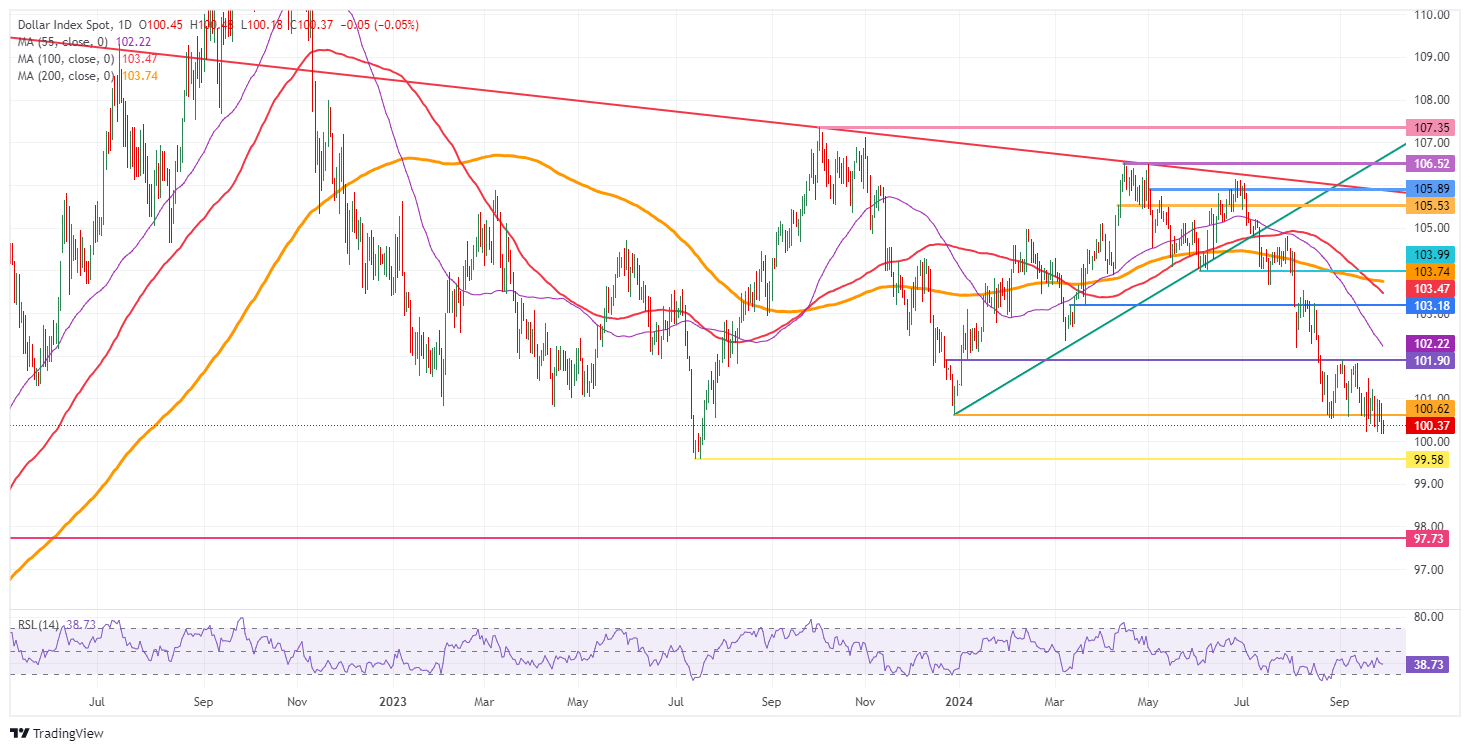US Dollar ticks up after Bowman underlines Fed’s inflation target not being reached yet

- The US Dollar sees Fed’s Bowman providing small support.
- The US calendar starts slowely with Chicago PMIs and the Dallas Fed Manufacturing survey.
- The US Dollar Index keeps hovering near the 2024 low in search of substantial support.
The US Dollar (USD) trades broadly flat after Federal Reserve Governor Michelle Bowman pointed to inflation which is still “uncomfortably above” the 2% target, according to the Fed governor. This ahead of a busy week that will end with the key Nonfarm Payrolls data. The main theme surrounding the jobs data will be how much the US Federal Reserve (Fed) will cut rates in its November meeting.
On Monday’s economic calendar, the Chicago Purchasing Managers Index (PMI) for September has been released and the Dallas Fed Manufacturing Business Index for September is up next. With both indices in contraction territory, it will be interesting to see how they will move before US Federal Reserve Chairman Jerome Powell takes the stage around 17:00 GMT.
Daily digest market movers: Chicago PMI gives hope
- The Chicago Purchasing Managers Index for September came in better than expected, with a result of 46.6, beating the expected 46.2, and better than the 46.1 in August.
- At 14:30 GMT, the Dallas Fed Manufacturing Business Index for September is foreseen to be released. Expectations are similar to the ones for the Chicago PMI, with analysts anticipating the index to remain in contraction at -4.5 but improving from the previous -9.7.
- Two Fed speakers this Monday to look out for:
- Federal Reserve Governor Michelle Bowman dhas elivered a speech about the US economic outlook and monetary policy at the Bankers Association President/CEO Conference in Charleston, South Carolina. She said that Core Inflation is still very “uncomfortably above” the 2% target, Bloomberg reported.
- Around 17:00 GMT, Federal Reserve Chairman Jerome Powell delivers a speech about the US economic outlook at the 66th National Association for Business Economics annual meeting in Nashville, Tennessee.
- While the Shanghai Shenzhen CSI 300 composite index closed up over 8%, European and US equities are doing far worse with red numbers across the board.
- The CME Fedwatch Tool shows a 60.4% chance of a 25 basis-point rate cut at the next Fed meeting on November 7, while 39.6% is pricing in another 50-basis-point rate cut.
- The US 10-year benchmark rate trades at 3.76%, looking to test the three-week high at 3.81%
US Dollar Index Technical Analysis: Either way ahead of NFP
The US Dollar Index (DXY) is unable to move away from that fresh yearly low at 100.16. The biggest issue is that there are no technical levels to trade on. Either venturous traders will get in and could push the DXY back higher or they will wait for the next pivotal support sub-100.00 at 99.58.
A reshuffle of resistance levels is needed at the start of this week. With three daily closes below 100.62, this level is now considered a firm resistance. In case Dollar bulls can turn things around, look at 101.90 for the second resistance level on the upside. Just above there, the 55-day Simple Moving Average (SMA) at 102.22 will come in.
Time to make our homework as well for more downside. The fresh low of 2024 is at 100.16, so a test will take place before more downside takes place. Further down, and that means giving up the big 100.00 level, the July 14, 2023, low at 99.58 comes into play.
US Dollar Index: Daily Chart
Nonfarm Payrolls FAQs
Nonfarm Payrolls (NFP) are part of the US Bureau of Labor Statistics monthly jobs report. The Nonfarm Payrolls component specifically measures the change in the number of people employed in the US during the previous month, excluding the farming industry.
The Nonfarm Payrolls figure can influence the decisions of the Federal Reserve by providing a measure of how successfully the Fed is meeting its mandate of fostering full employment and 2% inflation. A relatively high NFP figure means more people are in employment, earning more money and therefore probably spending more. A relatively low Nonfarm Payrolls’ result, on the either hand, could mean people are struggling to find work. The Fed will typically raise interest rates to combat high inflation triggered by low unemployment, and lower them to stimulate a stagnant labor market.
Nonfarm Payrolls generally have a positive correlation with the US Dollar. This means when payrolls’ figures come out higher-than-expected the USD tends to rally and vice versa when they are lower. NFPs influence the US Dollar by virtue of their impact on inflation, monetary policy expectations and interest rates. A higher NFP usually means the Federal Reserve will be more tight in its monetary policy, supporting the USD.
Nonfarm Payrolls are generally negatively-correlated with the price of Gold. This means a higher-than-expected payrolls’ figure will have a depressing effect on the Gold price and vice versa. Higher NFP generally has a positive effect on the value of the USD, and like most major commodities Gold is priced in US Dollars. If the USD gains in value, therefore, it requires less Dollars to buy an ounce of Gold. Also, higher interest rates (typically helped higher NFPs) also lessen the attractiveness of Gold as an investment compared to staying in cash, where the money will at least earn interest.
Nonfarm Payrolls is only one component within a bigger jobs report and it can be overshadowed by the other components. At times, when NFP come out higher-than-forecast, but the Average Weekly Earnings is lower than expected, the market has ignored the potentially inflationary effect of the headline result and interpreted the fall in earnings as deflationary. The Participation Rate and the Average Weekly Hours components can also influence the market reaction, but only in seldom events like the “Great Resignation” or the Global Financial Crisis.
